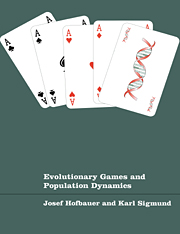Book contents
- Frontmatter
- Contents
- Preface
- Introduction for game theorists
- Introduction for biologists
- About this book
- Part one Dynamical Systems and Lotka–Volterra Equations
- Part two Game Dynamics and Replicator Equations
- 6 Evolutionarily stable strategies
- 7 Replicator dynamics
- 8 Other game dynamics
- 9 Adaptive dynamics
- 10 Asymmetric games
- 11 More on bimatrix games
- Part three Permanence and Stability
- Part four Population Genetics and Game Dynamics
- References
- Index
10 - Asymmetric games
Published online by Cambridge University Press: 05 June 2012
- Frontmatter
- Contents
- Preface
- Introduction for game theorists
- Introduction for biologists
- About this book
- Part one Dynamical Systems and Lotka–Volterra Equations
- Part two Game Dynamics and Replicator Equations
- 6 Evolutionarily stable strategies
- 7 Replicator dynamics
- 8 Other game dynamics
- 9 Adaptive dynamics
- 10 Asymmetric games
- 11 More on bimatrix games
- Part three Permanence and Stability
- Part four Population Genetics and Game Dynamics
- References
- Index
Summary
In asymmetric games, players in different positions have different strategy sets and payoff matrices. We discuss the replicator dyamics for such games, both for players who are forever tied to their positions and for players who can find themselves sometimes in one and sometimes in the other position.
Bimatrix games
So far we have always considered situations where the players are in symmetric positions: same set of strategies, same payoffs. However, there are many conflicts which are asymmetric. Thus food is more important for a starving animal than for a replete one, while the risk of injury is smaller for a stronger contestant, etc. In fact, asymmetries are not only incidental, but quite often essential features of the game: for example, in conflicts between males and females, between parents and offspring, between the owner of a habitat and an intruder, or between different species. If we restrict ourselves again to conflicts settled in pairwise encounters, and finite numbers of pure strategies, we are led to bimatrix games.
Thus let us distinguish between players in position I and in position II (for instance, White and Black in chess). In position I, a player has n strategies, and in position II he has m strategies. The payoffs are given by the matrices A for I and B for II. Thus a player in position I using strategy i against a player in position II using strategy j obtains the payoff aij, and the opponent obtains bji.
- Type
- Chapter
- Information
- Evolutionary Games and Population Dynamics , pp. 113 - 125Publisher: Cambridge University PressPrint publication year: 1998
- 1
- Cited by

